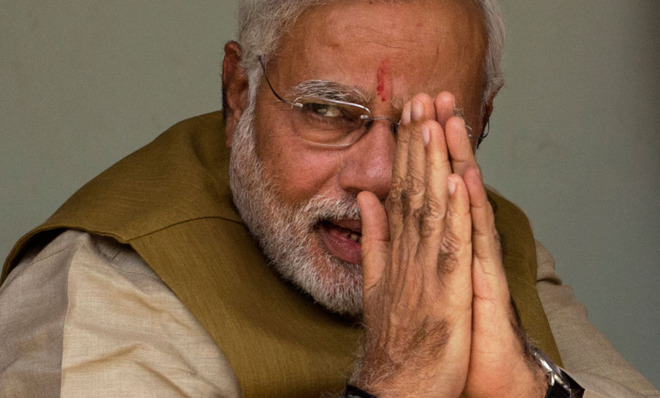What Narendra Modi's big American debut means for climate change
When the controversial Indian prime minister meets President Obama, the environment should be a top issue on the table


A free daily email with the biggest news stories of the day – and the best features from TheWeek.com
You are now subscribed
Your newsletter sign-up was successful
Next week, Indian Prime Minister Narendra Modi will make his first official visit to the United States since his election in May. Modi will spend two days in Washington, D.C., meeting with President Obama on a wide variety of issues — and for a refreshing change, climate change is likely to be at the top of the agenda.
The U.S.'s relations with India have suffered over the past year. The arrest of an Indian diplomat in New York City and trade-related disputes have been two high-profile tiffs, amid an overall sense that the relationship has drifted during the Obama administration. Indeed, that the meeting is even taking place is a success for Modi, who for years was barred from receiving a U.S. visa due to his alleged role as chief minister in sectarian riots in Gujarat in 2002 that led to the deaths of more than 2,000 Muslims.
With the U.S. bowing to the political reality of his election, he is now a welcome guest in the United States. And on the issue of climate change, there is a golden opportunity for Modi and Obama to bolster U.S.-India ties while advancing a mutually beneficial agenda.
The Week
Escape your echo chamber. Get the facts behind the news, plus analysis from multiple perspectives.

Sign up for The Week's Free Newsletters
From our morning news briefing to a weekly Good News Newsletter, get the best of The Week delivered directly to your inbox.
From our morning news briefing to a weekly Good News Newsletter, get the best of The Week delivered directly to your inbox.
Looking at the items on the agenda, including the regional security dynamic and economic cooperation, it is readily apparent that climate change and energy are essential issues to both administrations. To be sure, analysts were disappointed Modi did not attend the United Nations' Climate Summit being held this week (Environment Minister Prakash Javadekar went in his place). And it was disheartening to hear Modi seemingly raise questions about the validity of scientific theories about climate change. This was then capped off by quotes from anonymous Indian officials, who told Business Standard's Nitin Sethi that they worried the summit would "prejudge" the formal negotiations for an agreement in Paris next year.
But despite this backpedaling by Modi and his government, the official Indian position remains that climate change is a serious concern. While much of the global focus, including at the U.N. summit, has been on climate mitigation — preventing future damage through reductions in carbon emissions — there also needs to be an increased regional focus on how countries can adapt to protect people against the damage that global warming is already causing.
Recent flooding from monsoon rain in the northern region of Kashmir only underscores this critical need. In addition to the physical damage, hundreds of thousands of people face potential disease from widespread stagnant water. The National Disaster Management Authority (NDMA), India's federal disaster agency, has reportedly suffered from absentee leadership, seriously hampering the civilian response to the flooding.
Building resilience and disaster management capabilities should be a high priority of the U.S.-India relationship going forward. Obama and Modi should capitalize on their first meeting to agree on the necessary steps.
A free daily email with the biggest news stories of the day – and the best features from TheWeek.com
The Obama administration has made a good first step in announcing its executive order on climate-resilient international development at the U.N. Climate Summit, a step designed to ensure U.S. aid programs overseas fully address climate change contingencies. Such cooperation in the Indo-American context would take place on two tracks, civilian and military. While the U.S. Agency for International Development (USAID) rightfully prioritizes the de-carbonization of India's economy and resilience in the agricultural sector, it should begin to more forthrightly include disaster response and recovery.
India's main disaster relief agency could benefit from more regular consultations with the U.S. on these issues, including on advanced meteorological warning, which is included as a key part of the administration's proposals. The U.S. disaster management agency, FEMA, is active in the Asia Pacific Economic Community (APEC) Emergency Preparedness Working Group. While India is not an APEC member, a stronger relationship with the United States on these issues will enable more robust regional knowledge-sharing between India and APEC member-states. The same goes for the Association of Southeast Asian Nations (ASEAN), of which India is not a member, but does participate in its annual East Asia Summits.
The United States and Indian navies have begun an impressive record of cooperation on humanitarian assistance and disaster relief, including making them a key part of pre-planned exercises in the Indian Ocean. As a study by the CNA Corporation notes, closer cooperation has been limited by domestic political constraints in India, which does not want to be seen as too directly tied to the American military, even in an area such as disaster assistance. As disasters become more prevalent, however, that resistance may soften. Sound risk-management suggests future planning needs to be undertaken now, before we are completely overwhelmed by a proliferation of on-the-ground disasters.
The consensus among the community of scientists studying climate change is that severe weather will occur more frequently and with less predictability over the course of the next century. The catastrophes arising from this vulnerability will challenge not only developing countries like India, but established ones like the United States. Modi's visit to the U.S could mark the beginning of a sustained bilateral response to that threat.
Neil Bhatiya is a Policy Associate at The Century Foundation, where he works on issues related to U.S. foreign policy, with a specific focus on South Asia and climate change.
